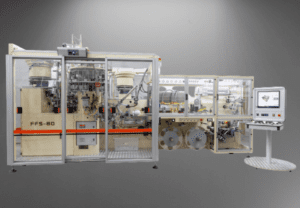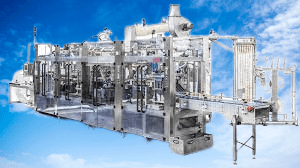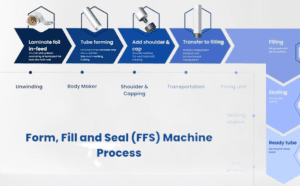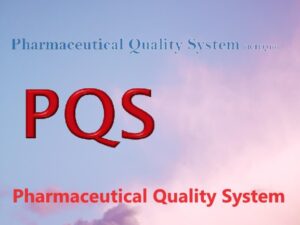A Form Fill Seal Machine (FFS) is an automated packaging equipment that integrates the processes of forming a package, filling it with a product, and sealing it, all in a single operation. It is commonly used in various industries such as food, pharmaceuticals, and cosmetics. The FFS machine typically starts with a flat film roll that is formed into a specific package shape, then the product is dispensed or poured into the formed package, and finally, the package is sealed to ensure product containment and freshness. FFS machines offer efficient and high-speed packaging solutions, reducing labor costs and improving productivity. Discover the benefits of FFS machines and find the ideal packaging solution for your business.
Working Principle of the Form Fill Seal (FFS) Machine
The Form Fill Seal (FFS) machine used in pharmaceutical plants is designed to package pharmaceutical products such as tablets, capsules, powders, and liquids. The working principle of the FFS machine in a pharmaceutical plant involves the following steps:
- Film feeding: The FFS machine starts with a roll of packaging film which is unwound and fed through the machine.
- Forming: The packaging film is then formed into the desired package shape, such as a pouch or sachet, using a forming collar and a set of forming jaws. The formed package is then held open by the jaws.
- Filling: The pharmaceutical product is dispensed into the formed package using a filling mechanism such as a volumetric filler, a dosing pump, or a weighing scale.
- Sealing: Once the package is filled, the sealing process begins. The sealing jaws of the FFS machine come together and apply heat or pressure to the top and bottom of the package, sealing it shut.
- Cutting: The sealed package is then cut from the film roll using a cutting machine such as a rotary knife or a guillotine.
- Discharge: The completed package is discharged from the FFS machine for further processing, such as labeling, cartooning, or case packing.
Throughout the process, the FFS machine is controlled by a programmable logic controller (PLC) or a human-machine interface (HMI) which ensures accuracy, consistency, and reliability in the packaging process.
In pharmaceutical plants, FFS machines must comply with strict regulatory requirements and industry standards to ensure the safety and efficacy of the packaged products. This may involve incorporating additional features such as product counting, tamper-evident seals, and serialization for traceability.
Types of Form Fill Seal Machine (FFS)
There are several types of Form Fill Seal (FFS) machines available, designed to meet different packaging requirements and product characteristics. Here are some common types of FFS machines:
Vertical Form Fill Seal (VFFS) Machine:
-
-
This type of FFS machine forms, fills, and seals packages in a vertical orientation. It is commonly used for packaging dry goods, powders, granules, snacks, and other solid products.
-
Horizontal Form Fill Seal (HFFS) Machine:
-
-
HFFS machines package products in a horizontal configuration. They are suitable for packaging solid products, liquids, creams, and other viscous or flowable substances. HFFS machines are commonly used for packaging items such as candies, chocolates, soaps, and sachets.
-
Thermoform Fill Seal (TFFS) Machine:
-
-
TFFS machines utilize thermoforming technology to create packages from a roll or sheet of plastic. The machine forms the plastic into a cavity or tray, fills it with the product, and then seals it. TFFS machines are often used for packaging products like medical devices, blister packs, and food items.
-
Stick Pack Form Fill Seal Machine:
-
-
This specialized FFS machine is designed to produce stick packs, which are long, narrow packages commonly used for single-serve powders, liquids, and granules. Stick pack machines form the packaging material into a tube shape, fill it with the product, and then seal it longitudinally.
-
Pre-made Pouch Form Fill Seal Machine:
-
-
In this type of FFS machine, pre-made pouches are used instead of forming the packaging material from a roll. The machine opens the pre-made pouch, fills it with the product, and then seals it. This type of FFS machine is often used for packaging snacks, liquids, and powders.
-
Aseptic Form Fill Seal Machine:
-
-
Aseptic FFS machines are specifically designed for the packaging of sterile or aseptic products. These machines incorporate advanced sterilization and contamination control measures to maintain product integrity and ensure aseptic packaging of pharmaceuticals, injectables, and other sensitive products.
-
These are just a few examples of the types of FFS machines available. Each type offers unique capabilities and features to accommodate different packaging needs and product requirements.
Form fill seal technology
Form Fill Seal (FFS) technology is an automated packaging process that integrates the functions of forming a package, filling it with a product, and sealing it, all in a continuous operation. FFS technology offers several advantages, including increased efficiency, reduced labor costs, improved product safety, and enhanced packaging flexibility. Here’s a breakdown of the key elements of FFS technology:
- Forming: FFS machines utilize a roll of flat packaging film or a web of packaging material. The film is unwound and guided through the machine, where it passes through a forming section. In this section, the film is shaped or molded into the desired package configuration, such as pouches, sachets, or bags. The forming process can involve the use of forming collars, forming shoulders, or mandrels.
- Filling: Once the packaging material is formed, the product to be packaged is introduced into the formed package. The filling mechanism varies depending on the specific application and product. It can involve volumetric fillers, auger fillers, weighers, liquid pumps, or other types of filling systems. The filling mechanism accurately dispenses the product into the formed package, ensuring precise dosing and consistent fill levels.
- Sealing: After the package is filled, the FFS machine proceeds to the sealing stage. The sealing process is essential for maintaining product integrity and preventing contamination. Various sealing methods are employed, including heat sealing, ultrasonic sealing, or band sealing. Heat sealing is the most commonly used method, where heat is applied to the packaging material to create a secure and tamper-evident seal.
- Cutting and Discharge: Once the package is sealed, it is cut or separated from the film roll or web. This can be done using a rotary knife, guillotine, or other cutting mechanisms. The completed packages are then discharged from the FFS machine, ready for further processing, such as labeling, cartoning, or case packing.
- Control and Automation: FFS machines are equipped with control systems, typically based on programmable logic controllers (PLCs) or human-machine interfaces (HMIs). These systems enable precise control and monitoring of the packaging process, allowing operators to set parameters, adjust settings, track production data, and respond to any issues or errors.
FFS technology offers significant advantages in terms of speed, efficiency, and versatility, making it a popular choice for various industries, including food, beverages, pharmaceuticals, and cosmetics. The technology can be adapted to accommodate different package sizes, shapes, and materials, providing a flexible and cost-effective packaging solution.
Technical details of the Form Fill Seal (FFS) machine
| Aspect | Description |
|---|---|
| Machine Type | Vertical Form Fill Seal (VFFS) or Horizontal Form Fill Seal (HFFS) |
| Packaging Materials | Films such as polyethylene, polypropylene, laminates, etc. |
| Packaging Styles | Pillow bags, gusseted bags, stick packs, sachets, etc. |
| Filling Mechanism | Auger fillers, volumetric fillers, weighers, liquid pumps, etc. |
| Sealing Mechanism | Heat sealing, ultrasonic sealing, band sealing, etc. |
| Speed | Variable, typically ranging from 20 to 120+ packages per minute |
| Film Width Range | Usually 100mm to 1000mm (may vary depending on machine model) |
| Control System | Programmable Logic Controller (PLC) or Human-Machine Interface (HMI) |
| Optional Features | Date coding, gas flushing (modified atmosphere packaging), zipper application, tear notches, etc. |
| Power Supply | Typically 220V/380V, 50Hz/60Hz, three-phase |
| Air Pressure | 6-8 bar (87-116 psi) |
| Machine Dimensions | Varies depending on machine size and configuration |
| Machine Weight | Varies depending on machine size and configuration |
Major Components of the Form Fill Seal (FFS) Machine
In the Form Fill Seal (FFS) machine used in a pharmaceutical injectable plant, several major components work together to ensure the efficient and precise packaging of injectable products. Here are some of the key components:

- Film Unwinding System: This component holds and unwinds the packaging film roll, allowing it to feed smoothly into the machine.
- Film Forming System: The film forming system includes a forming collar and forming shoulders. These components shape the packaging film into the desired form, such as vials or ampoules, to accommodate the injectable product.
- Filling Mechanism: The filling mechanism is responsible for accurately dosing and filling the injectable product into the formed containers. Depending on the specific requirements, this can involve volumetric fillers, syringe fillers, or peristaltic pumps.
- Sealing System: The sealing system ensures that the filled containers are securely sealed to maintain product integrity and prevent contamination. It typically employs heat sealing technology, which utilizes heated elements to seal the packaging material.
- Sterilization and Cleanroom Systems: In pharmaceutical injectable plants, maintaining a sterile environment is crucial. These systems include components such as sterilization tunnels, laminar airflow units, and isolators, which help ensure the sterility of the packaging process.
- Control System: The control system, usually based on a programmable logic controller (PLC) or a human-machine interface (HMI), monitors and controls the operation of the FFS machine. It allows operators to set parameters, track production data, and adjust settings for optimal performance.
- Inspection Systems: To ensure product quality and safety, inspection systems are often integrated into the FFS machine. These systems can include vision systems, check weighers, and metal detectors to detect and reject any defective or contaminated containers.
- Conveyor Systems: Conveyor systems facilitate the movement of containers throughout the packaging process. They can include belt conveyors, rotary tables, or robotic arms to transport containers between different stations.
- Safety Features: FFS machines in pharmaceutical injectable plants incorporate various safety features, such as emergency stop buttons, interlocks, and guarding mechanisms, to protect operators and prevent accidents.
Applications of the Form Fill Seal FFS Machine
| Application | Description |
|---|---|
| Injectable Products | Packaging of vials, ampoules, pre-filled syringes, and IV bags |
| Tablets and Capsules | Blister packs, strip packs, individual or multi-dose packaging |
| Powders and Granules | Sachets, stick packs, pouches |
| Liquid Medications | Bottles, bottles with droppers, sachets, stick packs |
| Topical and Ointment Products | Tubes, sachets, blister packs, pump bottles |
| Medical Devices | Packaging of medical devices such as syringes, catheters, etc. |
| Nutraceuticals | Packaging of dietary supplements, vitamins, and minerals |
| Diagnostic Kits | Packaging of test kits for diagnostics and laboratory use |
| Over-the-counter (OTC) Drugs | Packaging of OTC medications such as pain relievers, cough syrups, etc. |
| Veterinary Medications | Packaging of medications for animals and pets |
Qualification of form fill seal machine
| Validation Step | Description |
|---|---|
| Design Qualification (DQ) | Evaluating and verifying the design of the FFS machine to ensure it meets intended requirements and industry standards. Assessing documentation, specifications, and safety features. |
| Installation Qualification (IQ) | Verifying the proper installation of the FFS machine, including checking equipment setup, utilities, connections, and alignment with the intended production line. |
| Operational Qualification (OQ) | Conducting tests and verifying that the FFS machine operates according to predetermined specifications and performance criteria. This includes testing filling accuracy, sealing integrity, control system functionality, and other critical parameters. |
| Performance Qualification (PQ) | Assessing the overall performance and capability of the FFS machine under actual production conditions. This includes running production batches, monitoring process parameters, and evaluating product quality, yield, and consistency. |
| Documentation and Reporting | Maintaining comprehensive documentation throughout the validation process, including protocols, test results, deviations, and final reports. Ensuring traceability and accountability for validation activities. |
| Requalification | Establishing a periodic requalification schedule to ensure the continued performance and compliance of the FFS machine. This may involve repeating specific qualification steps or conducting comprehensive requalification periodically. |
Form fill seal machine manufacturers
here are several reputable Form Fill Seal (FFS) machine manufacturers worldwide that provide high-quality packaging equipment. Here are some well-known FFS machine manufacturers:
- Bosch Packaging Technology (Germany)
- IMA Group (Italy)
- Marchesini Group (Italy)
- Robert Bosch GmbH (Germany)
- Hayssen Flexible Systems (USA)
- ProMach (USA)
- Nichrome India Ltd. (India)
- Viking Masek Global Packaging (USA)
- Mespack (Spain)
- Omag S.p.A. (Italy)
- Universal Pack (Italy)
- Matrix Packaging Machinery (USA)
- Ossid (USA)
- Fuji Machinery Co., Ltd. (Japan)
- Rovema GmbH (Germany)
Frequently Asked Questions:
What is the maximum packaging speed of the FFS machine?
Answer: A: The maximum packaging speed can vary depending on the machine model and product characteristics. It typically ranges from 20 to 120+ packages per minute.
What types of packaging materials can be used with the FFS machine?
Answer: The FFS machine can work with various packaging materials such as polyethylene, polypropylene, laminates, and other suitable films for pharmaceutical applications.
How is the filling accuracy ensured in the FFS machine?
Answer: Filling accuracy is ensured through the use of precise filling mechanisms such as volumetric fillers, dosing pumps, or weight-based systems, which are calibrated and validated to meet specific requirements.
What sealing methods are available in the FFS machine for pharmaceutical packaging?
Answer: The FFS machine can utilize heat sealing, ultrasonic sealing, or band sealing methods to create secure and tamper-evident seals on the packaging material.
Can the FFS machine handle multiple package sizes and configurations?
Answer: Yes, FFS machines can be designed to accommodate different package sizes, shapes, and configurations. They can be customized to meet specific requirements.
What safety features are incorporated into FFS machines for pharmaceutical applications?
Answer: FFS machines for pharmaceuticals often include safety features such as emergency stop buttons, interlocks, guarding mechanisms, and compliance with safety standards to ensure operator safety.
How is the sterility of the packaging process maintained in FFS machines for injectable products?
Answer: FFS machines for injectable products may incorporate features such as sterilization tunnels, laminar airflow units, and isolators to maintain a sterile environment during the packaging process.
Can the FFS machine handle sensitive or delicate products, such as biologics?
Answer: Yes, FFS machines can be designed to handle sensitive or delicate products by incorporating gentle handling mechanisms, precise control systems, and protective features to prevent product damage.
How is the film tension controlled in the FFS machine?
Answer: Film tension is controlled through the use of tension control systems that adjust the speed of film unwinding and incorporate sensors to maintain consistent tension throughout the packaging process.
What types of controls and automation are available in FFS machines?
Answer: FFS machines are equipped with control systems based on programmable logic controllers (PLCs) or human-machine interfaces (HMIs) that enable precise control, monitoring, and adjustment of machine parameters and performance.
Can the FFS machine integrate additional features such as date coding or serialization?
Answer: Yes, FFS machines can be equipped with additional features like date coding systems, serialization capabilities, and vision systems for product traceability and quality control.
How is product quality ensured during the packaging process in FFS machines?
Answer: Product quality is ensured through validation and monitoring of critical parameters, including filling accuracy, sealing integrity, code legibility, and quality inspections using vision systems or other inspection technologies.
Is the FFS machine compliant with regulatory standards and guidelines for pharmaceutical packaging?
Answer: Reputable FFS machine manufacturers ensure compliance with relevant regulatory standards such as Good Manufacturing Practices (GMP) and meet the specific requirements of the pharmaceutical industry.
Can the FFS machine be integrated into existing production lines?
Answer: Yes, FFS machines can be designed for seamless integration into existing production lines, considering factors such as space requirements, compatibility with downstream equipment,
You may also read about Microbiology Guidelines

